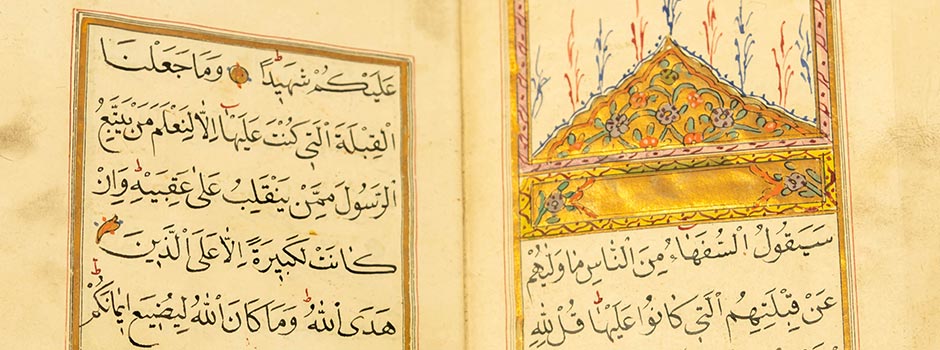
ART COLLECTIONS Quranic Juz Manuscripts in the Gazi Husrev Beg Library in Sarajevo
May 31, 2019 FEATURE, Art Collection

The Gazi Husrev Beg Library in Sarajevo, founded in 1537, is one of the largest European treasures of Islamic manuscripts with a collection of approx. 12,000 transcribed books. The oldest manuscripts date from the 12th century. A special collection is comprised of several hundred Quranic manuscripts, among which are particularly highly valuable transcripts from the Ilkhanid, Ottoman and Safavid periods. A special selection presents the manuscripts which have 30 Juz, each separately bound (juz is a part of the Quran, which has 20 pages). This approach was, from technical to artistic form, more demanding, and many of them were crafted more luxuriously.
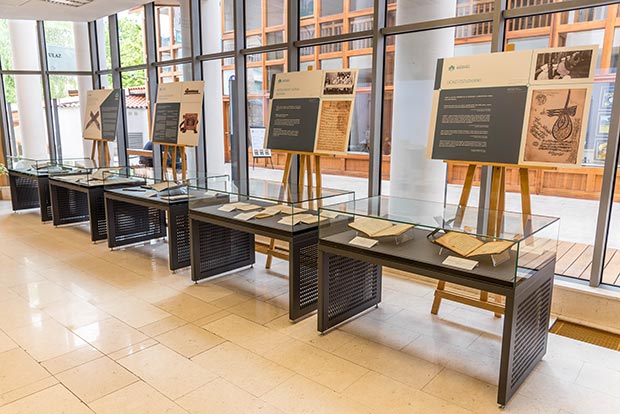 Installation view of the exhibition / Photo © Islamic Arts Magazine
Installation view of the exhibition / Photo © Islamic Arts Magazine
On the occasion of the month of Ramadan, Gazi Husrev Beg Library organized an exhibition titled Quranic Juz' Manuscripts, displaying very valuable manuscripts. Two of the most known are the Juz of Mehmed Pasha Sokolovic and the Juz from the famous Baghdad Quran, most likely endowed in the 16th century for the Ferhad Pasha Mosque in Banja Luka, Bosnia and Herzegovina. The patron of the first manuscript was the Ottoman Vizier Mehmed Pasha Sokolovic, in the 16th century. 22 Juz were preserved and among them was the first juz, where the Surah El-Fatiha was beautifully illuminated with large gold medallions. The second transcript is one of the most famous in the history of Islamic calligraphy and belongs to the so-called 'The Baghdad Quran'. It was transcribed in Bagdad at the beginning of the 14th century under the patronage of Ilkhanid Sultan Uljaytu. The Gazi Husrev Beg Library owns two juz. The Baghdad Quran is known for its large Muhaqqak letters, written in gold and black colours.
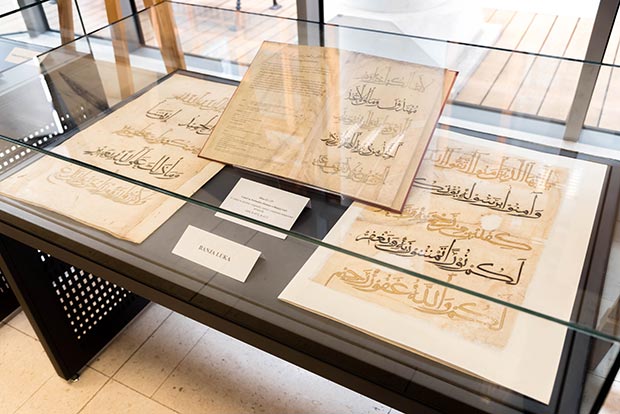 Juz from the famous Baghdad Qur'an, most likely endowed in the 16th century for the Ferhad Pasha Mosque in Banja Luka, Bosnia and Herzegovina, Gazi Husrev Beg Library / Photo © Islamic Arts Magazine
Juz from the famous Baghdad Qur'an, most likely endowed in the 16th century for the Ferhad Pasha Mosque in Banja Luka, Bosnia and Herzegovina, Gazi Husrev Beg Library / Photo © Islamic Arts Magazine
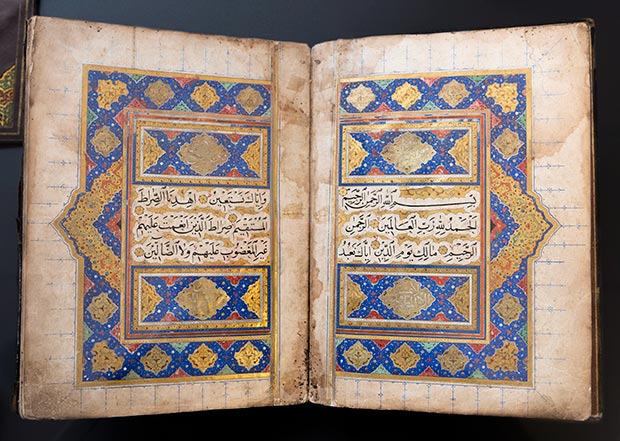 Juz of Mehmed Pasha Sokolovic / Photo © Islamic Arts Magazine
Juz of Mehmed Pasha Sokolovic / Photo © Islamic Arts Magazine
Apart from these two very valuable manuscripts, the exhibition also shows a collection of juz' that were mostly copied in Bosnia for the Bosnian mosques in the period from the 16th to the end of the 19th century. And these manuscripts are proof of the rich coping practice of the Ottoman period in Bosnia by domestic calligraphers.
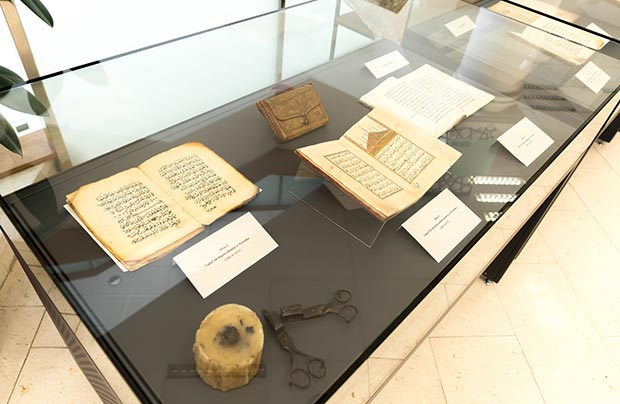 Quranic Juz Manuscripts, installation view / Photo © Islamic Arts Magazine
Quranic Juz Manuscripts, installation view / Photo © Islamic Arts Magazine
 Quranic Juz Manuscript / Photo © Islamic Arts Magazine
Quranic Juz Manuscript / Photo © Islamic Arts Magazine
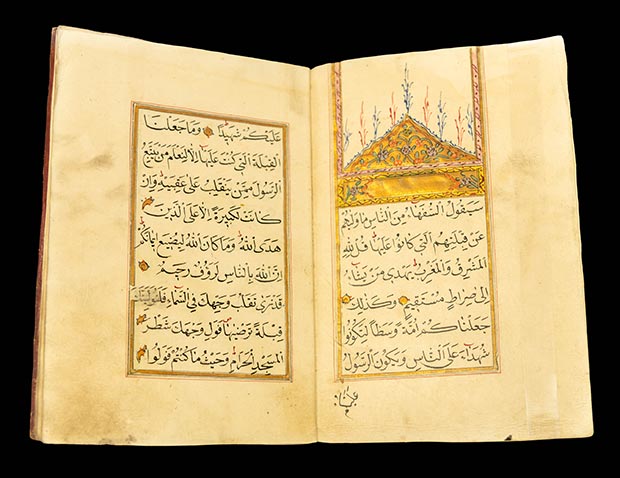 Quranic Juz Manuscript / Photo © Islamic Arts Magazine
Quranic Juz Manuscript / Photo © Islamic Arts Magazine
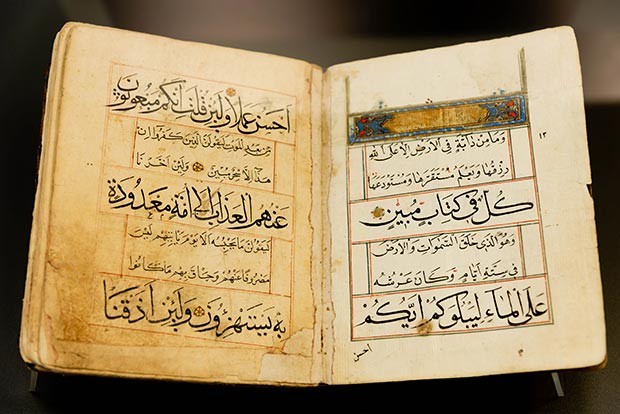 Quranic Juz Manuscript / Photo © Islamic Arts Magazine
Quranic Juz Manuscript / Photo © Islamic Arts Magazine
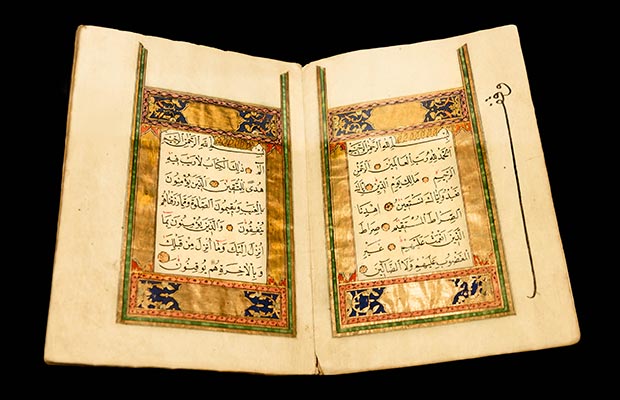 Quranic Juz Manuscript / Photo © Islamic Arts Magazine
Quranic Juz Manuscript / Photo © Islamic Arts Magazine
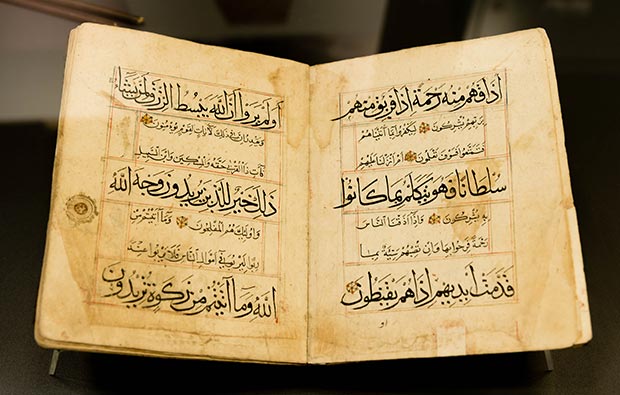 Quranic Juz Manuscript / Photo © Islamic Arts Magazine
Quranic Juz Manuscript / Photo © Islamic Arts Magazine
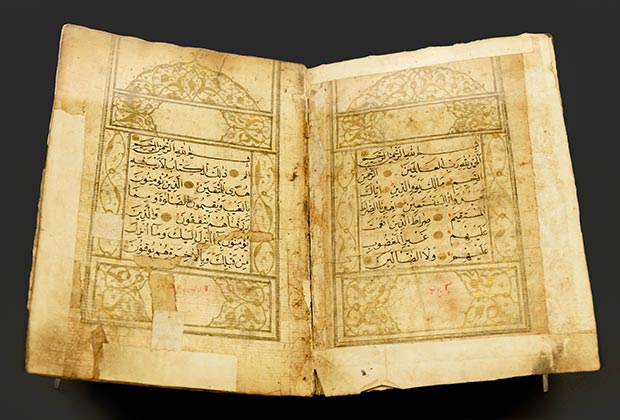 Quranic Juz Manuscript / Photo © Islamic Arts Magazine
Quranic Juz Manuscript / Photo © Islamic Arts Magazine
The exhibition also presents several artefacts related to learning and copying the Qur'an. Thus, we can see the carved Quran stand decorated with mother-of-pearl; two boxes in which Qur'an was guarded, a metal bowl in which water was standing to water fingers while turning the pages when reading Quran, etc.
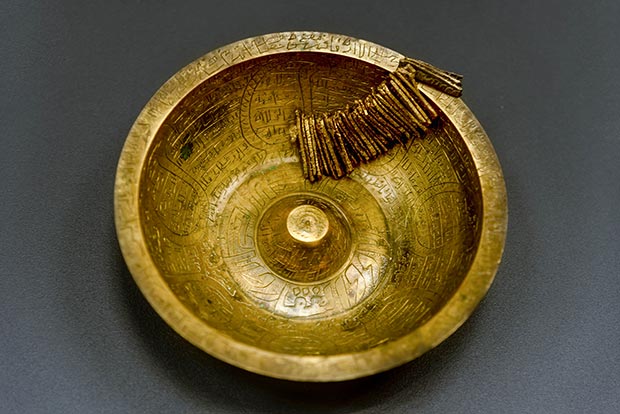 A metal bowl used to water fingers while turning the pages when reading Quran / Photo © Islamic Arts Magazine
A metal bowl used to water fingers while turning the pages when reading Quran / Photo © Islamic Arts Magazine
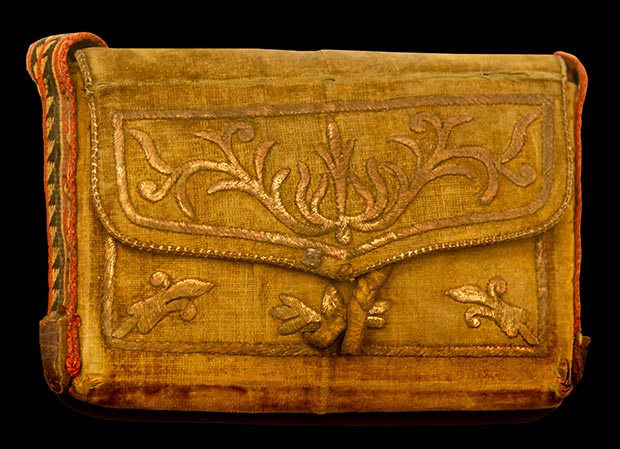 A pouch for safe keeping Quran / Photo © Islamic Arts Magazine
A pouch for safe keeping Quran / Photo © Islamic Arts Magazine
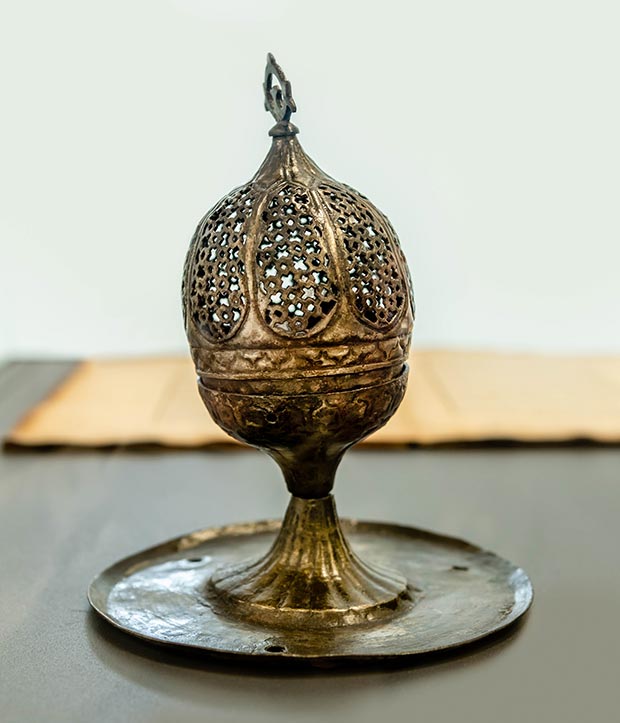 Incent burner holder / Photo © Islamic Arts Magazine
Incent burner holder / Photo © Islamic Arts Magazine
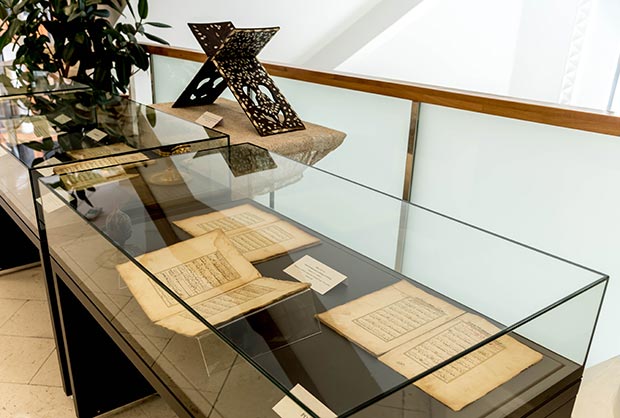 Quranic Juz Manuscripts, installation view / Photo © Islamic Arts Magazine
Quranic Juz Manuscripts, installation view / Photo © Islamic Arts Magazine
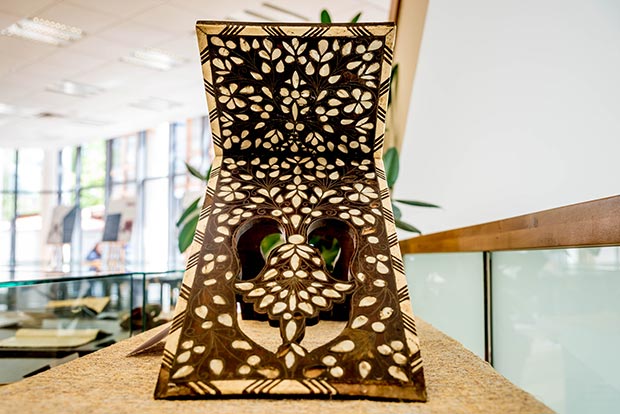 A carved Quran stand decorated with mother-of-pearl / Photo © Islamic Arts Magazine
A carved Quran stand decorated with mother-of-pearl / Photo © Islamic Arts Magazine
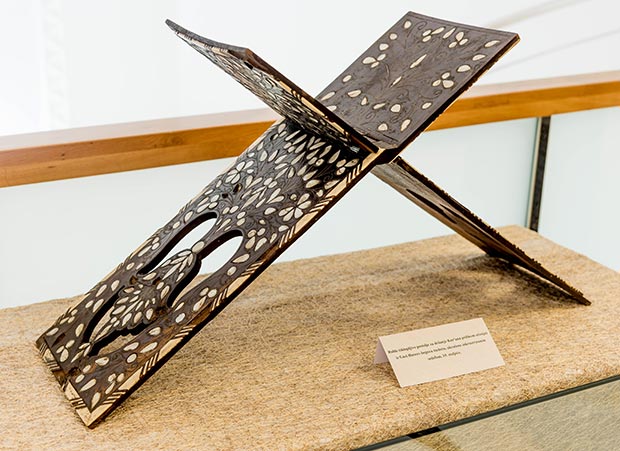 A carved Quran stand decorated with mother-of-pearl, another view / Photo © Islamic Arts Magazine
A carved Quran stand decorated with mother-of-pearl, another view / Photo © Islamic Arts Magazine
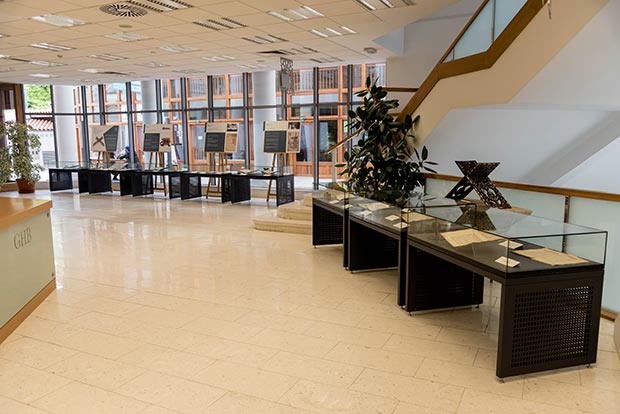 Quranic Juz' Manuscripts, installation view / Photo © Islamic Arts Magazine
Quranic Juz' Manuscripts, installation view / Photo © Islamic Arts Magazine
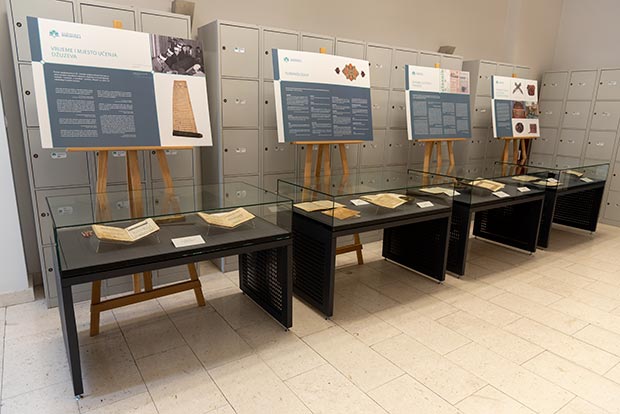 Quranic Juz Manuscripts, installation view / Photo © Islamic Arts Magazine
Quranic Juz Manuscripts, installation view / Photo © Islamic Arts Magazine
The exhibition is accompanied by suitable panels describing the practice and tradition of copying and teaching the Quran in Bosnia and Herzegovina.
Comments
Add a comment